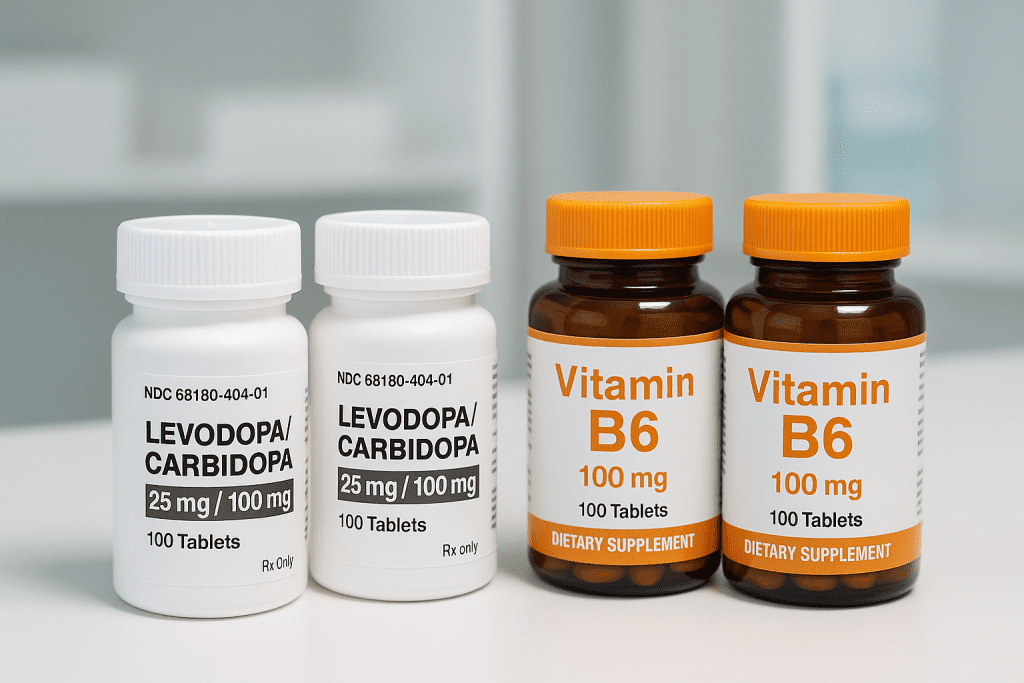If you or a loved one is managing Parkinson’s disease, understanding the interaction between vitamin B6 and levodopa is crucial. While levodopa is a cornerstone of Parkinson’s treatment, certain supplements—particularly pyridoxine (vitamin B6)—can interfere with its effectiveness. This guide explores how this interference happens, the risks of deficiency, and expert-backed strategies for safe supplementation. You’ll also learn how modern medications and monitoring can help balance treatment outcomes.
Quick Summary: Vitamin B6 and Levodopa Interaction
| Topic | Key Insight |
|---|---|
| Main Risk | Vitamin B6 increases levodopa metabolism outside the brain, reducing its effectiveness. |
| Signs of Interaction | Worsening symptoms like tremors, rigidity, and reduced motor control. |
| Safe Approach | Use levodopa with carbidopa to block the interaction. Avoid high-dose B6 supplements. |
| Deficiency Risk | Long-term levodopa/carbidopa use may cause B6 deficiency. |
| Best Practices | Regular blood monitoring, conditional B6 supplementation, dietary awareness. |
The vitamin B6 levodopa interaction can reduce treatment success, but it’s manageable with proper care.
How Vitamin B6 Interferes with Levodopa Treatment
Vitamin B6, also known as pyridoxine, plays a paradoxical role in Parkinson’s management. On the one hand, it supports over 300 enzymatic processes; on the other, it can severely impair levodopa’s action when taken in excess without safeguards.

The Mechanism Explained
Pyridoxine promotes the conversion of levodopa to dopamine outside the brain (in the periphery). While this might sound beneficial, it’s actually problematic. Levodopa must cross the blood-brain barrier to be effective. When it’s converted too early, less reaches the brain, and symptoms worsen.
- Even modest pyridoxine doses—5 mg/day or more—can trigger this interference.
- According to Drugs.com, vitamin B6 can enhance levodopa metabolism enough to render the drug far less effective.
- A systematic review found that vitamin B6 intake above 50 mg/day significantly reduces levodopa efficacy.
If you’re taking levodopa without a protective agent, this interaction could make symptoms like tremors, rigidity, and slowness resurface or worsen.
Medication Strategies to Prevent Vitamin B6 Interference
Carbidopa: The Protective Companion
To counteract pyridoxine’s impact, levodopa is commonly combined with carbidopa, a decarboxylase inhibitor. Carbidopa prevents the premature conversion of levodopa in the bloodstream, allowing more of it to reach the brain intact.
- A minimum of 70–100 mg/day of carbidopa is typically needed for optimal protection, according to clinical guidance.
- Carbidopa also helps reduce side effects like nausea by limiting dopamine’s peripheral activity.
Popular Levodopa-Carbidopa Formulations
Here’s a comparison of available combination therapies:
| Brand | Composition | Key Features |
|---|---|---|
| Sinemet | 25/100 mg | Immediate-release, taken 3x/day |
| Sinemet CR | 50/200 mg | Extended-release, taken 2x/day |
| Rytary | Mixed release | Smooth delivery, reduces dosing frequency |
| Dhivy | 6.25/25 mg segments | Allows fine-tuned dosage titration |
| Duopa | Intestinal gel | Consistent absorption, ideal for advanced cases |
These formulations neutralize the Parkinson’s supplements caution related to vitamin B6 by blocking peripheral levodopa conversion.
The Other Side: B6 Deficiency from Long-Term Treatment
Ironically, while B6 can diminish levodopa’s effectiveness, long-term use of carbidopa can cause B6 deficiency.

How It Happens
Carbidopa binds irreversibly to the active form of B6 (pyridoxal 5′-phosphate or PLP), reducing its availability in the body. Research from PubMed confirms that:
- All patients on intestinal Duopa infusion showed low plasma B6 levels.
- 72% of those on oral carbidopa-levodopa also had deficient levels.
- Higher levodopa doses correlated with worse deficiencies.
Consequences of Vitamin B6 Deficiency
Without enough B6, patients may develop:
- Peripheral neuropathy (numbness, tingling)
- Fatigue or confusion
- Refractory seizures in extreme cases, as seen in case studies
- Altered homocysteine metabolism, increasing cardiovascular risk
Related concerns? See our breakdown of “brain fog from B vitamins and migraine medication” for how B-vitamin imbalances affect cognition.
Clinical Strategies for Managing B6 and Levodopa Together
Monitoring and Supplementation
To stay ahead of complications, experts recommend:
- Routine B6 blood level checks, especially for those on high-dose or long-term levodopa.
- Using liver enzymes (AST and ALT), particularly the ALT/AST ratio, as biomarkers for B6 status.
- Targeted B6 supplementation—only when deficiency is confirmed. Doses must remain low (below 50 mg/day) to avoid interfering with levodopa.
Adjunctive Therapies and Dietary Support
Emerging research suggests new approaches:
- Opicapone, a COMT inhibitor, may protect against B6 depletion by improving methionine cycle function—referenced in this PMCID study.
- Emphasizing dietary B6 over supplements. Recommended daily intakes are:
- 1.4 mg/day for men
- 1.2 mg/day for women
B6-rich foods like bananas, poultry, and chickpeas can often meet this need safely.
For more dynamic management, use the best app for tracking vitamin and drug interactions to log symptoms and get real-time supplement advice.
Conclusion
The interaction between vitamin B6 and levodopa is one of the most clinically significant concerns for Parkinson’s patients using supplements. While pyridoxine can reduce levodopa’s effectiveness by increasing peripheral conversion, this issue is largely preventable with carbidopa-levodopa formulations. However, the long-term flip side is B6 deficiency, which must be monitored and addressed with care.
By understanding this delicate balance, staying informed about treatment options, and working closely with healthcare providers, patients can optimize their therapy and avoid unnecessary complications.
Explore more on Parkinson’s and vitamin safety across our site, including tips on managing brain fog from B vitamins and tracking interactions with our top-rated app.

